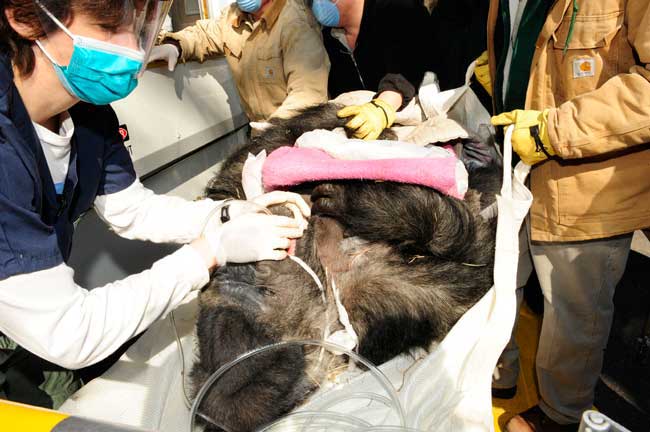Gorilla Gets a Brain Scan

Fubo, a 42-year-old western lowland gorilla, recently suffered a seizure.
Worried officials at the Bronx Zoo, where Fubo resides, arranged for an MRI brain scan. The result: Fubo's condition was caused by a lesion in the left temporal lobe of his brain, researchers said today.
The specific cause of the problem has not yet been determined, according to a statement from the Wildlife Conservation Society. Fubo's condition is not treatable with surgery, so veteranarians will continue to treat him with medication in an effort to control his seizures and other symptoms.
"Thanks to the generosity of The Brain Tumor Foundation, we were able to perform an MRI of Fubo's brain and this gave us insights into the possible cause of his illness. The ability to use their mobile MRI unit allowed us to perform this procedure right here at the Bronx Zoo," said Dr. Paul P. Calle, Director of the Wildlife Conservation Society's Zoological Health Program and a participant in the MRI procedure. "These images have given us a better understanding of the possible causes of Fubo's problem and have helped to guide his care."
Fubo is one of two adult males, or silverbacks, living in the Bronx Zoo's Congo Gorilla Forest exhibit, which houses one of the largest breeding groups of western lowland gorillas in North America (more than 20 individuals).
The gorilla was sedated for the two-hour procedure, placed into the MRI's magnetic tube for the scans (a snug fit for a primate patient with gorilla-sized shoulders), and returned to the Congo Gorilla Forest as planned. Under strict protocol, the MRI Unit was cleaned and sanitized after the procedure.
The Brain Tumor Foundation's Mobile Unit has recently embarked on the "Road to Early Detection," a national campaign that promotes the early detection of brain tumors. The Unit travels New York City and its five boroughs offering free brain scans to everyone, especially those who do not have medical services available to them. The Unit is named after Bobby Murcer, the professional baseball player and broadcaster who was an advocate for The Brain Tumor Foundation's "Road to Early Detection" campaign. Murcer succumbed to a brain tumor in July of 2008.
Sign up for the Live Science daily newsletter now
Get the world’s most fascinating discoveries delivered straight to your inbox.
"If found early, most brain tumors can be removed before symptoms become apparent," said Dr. Patrick Kelly, Founder and President of The Brain Tumor Foundation. "The only way to do this is with an MRI brain scan. Our goal is to make MRI brain scans as routine as examinations for breast, colon, and prostate cancer." An MRI (Magnetic Resonance Imaging) is a frequently used technique for imaging structures within the body. The method is more effective at imaging organs and soft tissue than the CT scan (computed tomography) and is often used in neurological scans. The scans are achieved with a powerful magnetic field that aligns hydrogen atoms within the body of the patient. The hydrogen atoms then produce magnetic fields of their own that can be manipulated with additional magnetic fields and detected by the scanning mechanism.
'Useless' female organ discovered over a century ago may actually support ovaries, study finds
A mysterious, 100-year solar cycle may have just restarted — and it could mean decades of dangerous space weather
'Quiet Chernobyl' changed Earth's surface so much the planet's mantle is still moving 80 years later










